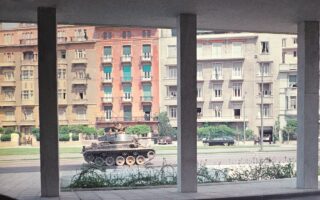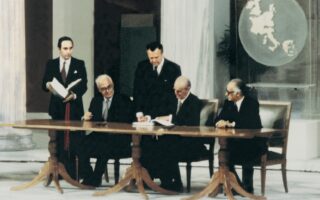The Metapolitefsi generation

I am a child of the Metapolitefsi, the luckiest generation in Greekdom since the Battle of Manzikert, a generation that experienced the fullest and maturest period of democracy this country has ever known. We were in the age of prosperity, the last generation with the luxury of knowing that we would have a better life than those of our parents. Most of us didn’t have to work to study – we studied with our parents’ money and lived well thanks to our children’s money; they’re still paying.
By the time Greece went bankrupt, most of us had done whatever we were going to do professionally, had evolved into extroverted and cosmopolitan people and had accomplished most of our goals. We were in our 50s when the crisis struck, at the top of the pile of sand in the bottom part of the hourglass of wealth, before it was turned again and our children plummeted into the void first. The whole thing was tough for many people, of course, but for young people just starting out in life, it was much crueler.
The fall of the junta in 1974 was a celebration; an orgy of democracy, joy and festivities. People poured out into the streets at every given opportunity, to protest, to party – the youngsters like me needed the socialization after a suffocating period during which our parents and teachers transmitted their sense of fear of something we couldn’t fully understand. Children living in downtown Athens like me started becoming aware of just how unfree the country was with the student occupations of the Athens Law School and the Polytechnic, of course – I imagine the realization came later in the countryside, if ever. That’s why our festivities were so much louder – we were experiencing freedom without really knowing that we had lost it.
Our heroes were the fighters of the Polytechnic and the anti-dictatorship movement – and all those who donned that mantle. They were the rock stars, the ultimate idols of that time. Through them, we despised the junta, their jailers and torturers, regarding them as evil incarnate. This explains the despicable collective tolerance for November 17 in the early years, back when it was executing torturers. We were in the grips of the kind of fanaticism that comes with enlightenment.
We marched in protests beside those who actually fought against the dictatorship and believed this somehow aligned us with them, that we, too, were part of a struggle of some kind. They eventually got lumped in with a lot of people who had played no part whatsoever, of all ages – post-battle fighters. The years went by and my generation ended up producing more fighters for democracy than any other, as the struggle came to mean participation in protest rallies, meetings and pre-elections campaigns.
The post-junta era was like an overprotective mother who didn’t want to let her children grow up and face life’s harsh realities on their own
Many, of course, concealed their lack of resistance against the junta in the euphoria of the return to democracy; after all, the majority of Greeks had been absent from any active opposition. But those who couldn’t hide from us were the adults we knew – our relatives, our teachers. My father was a senior educator, training teachers at the Marasleio School. I asked him about it, and he told me: “What did you expect us to do? Stop educating teachers and children?” Now I understand him, though I didn’t at the time. I loved him very much and didn’t want to push the issue further. But when it came to the teachers, I was relentless, as were all of us.
Something happened then that, in retrospect, I realize was pivotal to what we later called the culture of the post-junta era. The teachers lost their authority. They lost our respect. And their behavior toward students changed dramatically. Like it or not, they were the bearers of an authoritarian school system, one that had been rife with verbal and physical violence – a violence that vanished in September 1974 when we returned to school. The teachers became almost fearful of us, afraid they might be swept away by the tide of the famous de-juntafication. They themselves undermined their authority.
This dethroning and demystification of teachers became ingrained in us. In our generation, the ideas of anti-authoritarian education flourished, and we passed on to our children – some consciously, others unconsciously – the questioning of the teacher’s authority. For some children, this meant a productive challenge to academic authority; for others, it led to a lack of respect for their teachers. I suspect that today’s extreme images of children physically assaulting teachers have their roots in the mass erosion of teaching authority that took place in 74.
Similarly, I suspect that the image of students building a wall to enclose their professor in an office has its roots in the servile behavior of junta-affiliated teachers who returned and gave us the easiest exams to avoid angering us. My suspicion – that the erosion of an informal hierarchy that had dominated Greek society for decades was at play – was reinforced during my military service, when I saw officers with junta-era insignia being disrespected. The concept of hierarchy had corroded in the military, and I imagine in other state structures as well.
I believe all of this contributed to a growing immaturity in our society. The post-junta era was like an overprotective mother who didn’t want to let her children grow up and face life’s harsh realities on their own, always creating a protective cocoon around them. Anti-authoritarianism became an ideology, but one without substance. Teachers were no longer supposed to reprimand children, university students were granted their own sanctuary in the form of asylum to feel safe, study with great leniency, take years to graduate, and then have the opportunity to work in the public sector or elsewhere with generous state subsidies. That’s how we were raised, and that’s how we raised our children. In the end, we deprived them of their wealth, having first diminished their sense of personal responsibility. Personal responsibility, the core of democracy, faded in the name of democracy itself.





